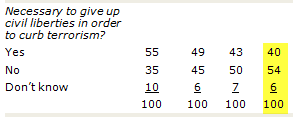How the public’s attitude toward civil liberties and national security have changes in the last ten years since 9/11. It’s not what you would think. We have evolved, our politicians haven’t.
Public opinion surprises
by Glenn Greenwald
The most common claim to justify endless civil liberties erosions in the name of security — and to defend politicians who endorse those erosions — is that Americans don’t care about those rights and are happy to sacrifice them. The principal problem with this claim is that it is false, as a new Pew Research poll demonstrates:
It was only in the immediate aftermath of 9/11 that a majority of Americans was prepared to sacrifice civil liberties in the name of Terrorism. But this game-playing with public opinion — falsely claiming that the public is indifferent to civil liberties in order to justify assaults on them — is common. To this day, if you criticize President Obama for shielding Bush officials from investigations, you’ll be met with the claim that doing so was politically necessary, even though poll after poll found in the wake of Obama’s inauguration that large majorities wanted those inquiries. Similarly, when The New York Times revealed that the Bush administration was illegally spying on the communications of Americans without the warrants required by law, Beltway pundits such as Joe Klein in unison “warned” Democrats that Americans were in favor of such measures and it would be politically suicidal to object, even though polls repeatedly showed the opposit. The same happened when Beltway pundits repeatedly insisted that Americans opposed Congressional investigations into the U.S. Attorneys scandal even when polls showed huge majorities wanting them.
Post-September 11, NSA ‘enemies’ include us
by James Bramford
Somewhere between Sept. 11 and today, the enemy morphed from a handful of terrorists to the American population at large, leaving us nowhere to run and no place to hide.
Within weeks of the attacks, the giant ears of the National Security Agency, always pointed outward toward potential enemies, turned inward on the American public itself. The Foreign Intelligence Surveillance Court, established 23 years before to ensure that only suspected foreign agents and terrorists were targeted by the NSA, would be bypassed. Telecom companies, required by law to keep the computerized phone records of their customers confidential unless presented with a warrant, would secretly turn them over in bulk to the NSA without ever asking for a warrant.
snip
Despite his hollow campaign protests, President Barack Obama has greatly expanded what President George W. Bush began. And through amendments to the Foreign Intelligence Surveillance Act, Congress largely ratified the secret Bush program.
Why does safer mean less free?
by Jeffrey Rosen
After Sept. 11, we’ve been told repeatedly, “Everything changed.” When it comes to the legal balance between liberty and security, however, the truism is at least partly true.
There’s no question that the legal dynamics of privacy and security were transformed by a series of laws and technologies that, in some cases, made us less free but no more safe. Many of these legal responses – the PATRIOT Act, for example – had been proposed years, even decades, earlier but passed only in the wave of fear after the terrorist attacks.
In particular, three of the post-Sept. 11 legal reactions – involving terrorist detentions, domestic surveillance and airport security – have made us a different nation than we could have imagined 10 years ago.
Two administrations, Republican and Democratic, have now asserted the right to detain indefinitely suspected terrorists without trial, to seize the private information of any citizen on the government’s say-so and to subject innocent citizens to virtual strip searches at the airport even when less invasive security technologies are available.
It’s far too extreme to say that, with these legal changes, America has morphed into something unrecognizable – becoming, say, Chile as a result. In fact, things could have been worse – and many of our European allies made similarly unfortunate decisions. But with more leadership, from both the president and Congress, we could have been freer without becoming less safe.
Ten years after 9/11, the ACLU joins all Americans in remembering the unspeakable losses suffered on that tragic day. The 10th anniversary of 9/11 provides an opportunity to reflect on the turbulent decade behind us, and to recommit ourselves to values that define our nation, including justice, due process, and the rule of law.
Torture: Just as the public debate over the legality, morality, and efficacy of torture was warped by fabrication and evasion, so, too, were the legal and political debates about the consequences of the Bush administration’s lawbreaking. Apart from the token prosecutions of Abu Ghraib’s “bad apples,” virtually every individual with any involvement in the torture program was able to deflect responsibility elsewhere. The military and intelligence officials who carried out the torture were simply following orders; the high government officials who authorized the torture were relying on the advice of lawyers; the lawyers were “only lawyers,” not policymakers. This had been the aim of the conspiracy: to create an impenetrable circle of impunity, with everyone culpable but no one accountable.
Indefinite detainment: President Obama’s pledge to close Guantanamo was undermined by his own May 2009 announcement of a policy enshrining at Guantanamo the principle of indefinite military detention without charge or trial….The real danger of the Guantanamo indefinite detention principle is that its underlying rationale has no definable limits.
Targeted assassinations: No national security policy raises a graver threat to human rights and the international rule of law than targeted killing….Under the targeted killing program begun by the Bush administration and vastly expanded by the Obama administration, the government now compiles secret “kill lists” of its targets, and at least some of those targets remain on those lists for months at a time.
Surveillance: The Obama administration, like the Bush administration before it, has used excessive secrecy to hide possibly unconstitutional surveillance….Hobbled by executive claims of secrecy, Senators Ron Wyden and Mark Udall have nevertheless warned their colleagues that the government is operating under a “reinterpretation” of the Patriot Act that is so broad that the public will be stunned and angered by its scope, and that the executive branch is engaging in dragnet surveillance in which “innocent Americans are getting swept up.”
Profiling: No area of American Muslim civil society was left untouched by discriminatory and illegitimate government action during the Bush years….To an alarming extent, the Obama administration has continued to embrace profiling as official government policy….There are increasing reports that the FBI is using Attorney General Ashcroft’s loosened profiling standards, together with broader authority to use paid informants, to conduct surveillance of American Muslims in case they might engage in wrongdoing.
Data mining: Nothing exemplifies the risks our national surveillance society poses to our privacy rights better than government “data mining.”….The range and number of these programs is breathtaking and their names Orwellian. Programs such as eGuardian, “Eagle Eyes,” “Patriot Reports,” and “See Something, Say Something” are now run by agencies including the Director of National Intelligence, the FBI, the Department of Defense, and the Department of Homeland Security….Without effective oversight, security agencies are now also engaged in a “land grab,” rushing into the legal vacuum to expand their monitoring powers far beyond anything seen in our history. Each of the over 300 million cell phones in the United States, for example, reveals its lcation to the mobile network carrier with ever-increasing accuracy, whenever it is turned on, and the Justice Department is aggressively using cell phones to monitor people’s location, claiming that it does not need a warrant.
Our choice is not between safety and freedom; in fact it is our fundamental values that are the very foundation of our strength and security.



 On this day in 1776, the Continental Congress formally declares the name of the new nation to be the “United States” of America. This replaced the term “United Colonies,” which had been in general use.
On this day in 1776, the Continental Congress formally declares the name of the new nation to be the “United States” of America. This replaced the term “United Colonies,” which had been in general use.
Recent Comments